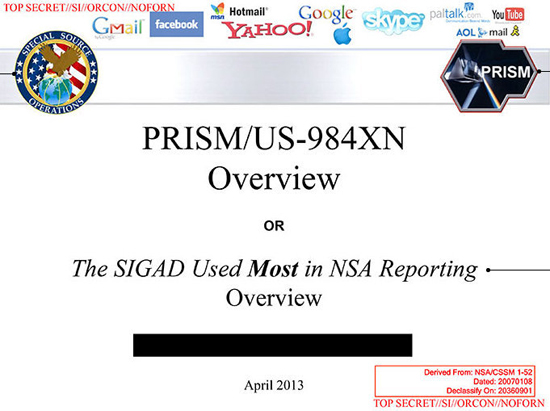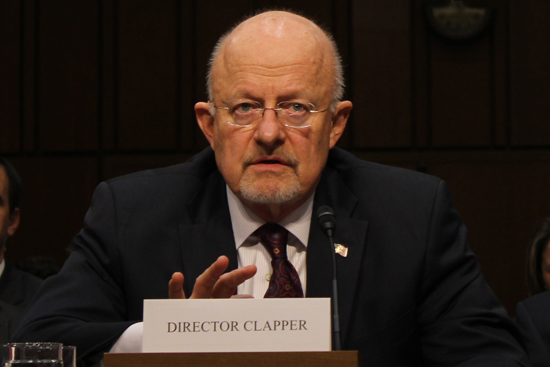LAW Prof Weighs US Phone, Internet Surveillance
Moves were legal, cautionary sign of the times

On Thursday, June 6, the Washington Post published a set of PowerPoint slides detailing PRISM, NSA’s surveillance program that collects information on foreigners overseas from Google, Facebook, Apple, and other internet companies.
Last Thursday, US intelligence officials confirmed that for six years the National Security Agency (NSA) has been collecting information on foreigners overseas from Google, Facebook, Apple, and other internet companies through a program called PRISM, in what they say is an effort to root out threats to national security.
The revelation of that snooping arrived on the heels of a government acknowledgement of a separate seven-year-long program sponsored by the NSA and the Federal Bureau of Investigation that combed records of all telephone calls handled by Verizon inside the United States. Other companies have not acknowledged whether they have also complied with the government demand. Government officials say both programs operate within the bounds of law, as is spelled out by the Patriot Act of 2001, but that assurance has failed to quell the outrage of many Americans, including Jim Sensenbrenner, the Wisconsin Republican congressman who introduced the legislation. Sensenbrenner calls the seizure of millions of phone records “excessive and un-American.”
BU Today spoke with Tracey Maclin, a School of Law professor and the Joseph Lipsitt Faculty Research Scholar, author of The Supreme Court and the Fourth Amendment’s Exclusionary Rule (Oxford University Press, 2013), about what type of information the programs target, why civil liberties advocates are alarmed, and what this news reveals about President Barack Obama.
BU Today: PRISM and the Verizon surveillance programs are allegedly legal and have been vetted by all three branches of government. But they definitely have an air of Big Brother to them. Is this surveillance legal, and are we naïve to think that our information is private?

Maclin: If they have been authorized by the Foreign Intelligence Surveillance Act court, then they’re legal. I also base that opinion on what seems to be not much of an uproar from members of Congress. They seem to think that this is OK in the sense that the administration has been following the statutory rules.
We are a little naïve to think this information is going to remain private. Anything that goes out on the internet, whether it be emails or Facebook or social media, people should assume that that information is going to be in the hands of third parties and could eventually end up in the hands of the government.
Both programs began in the Bush administration, but President Obama has continued to implement them. What is the rationale for keeping these active?
The rationale is about protecting the country, keeping an eye on terrorists, and preventing another terrorist attack. They’re trying to find out who these terrorist suspects are in contact with and trying to preempt terrorist attacks before they occur.
In the Verizon case, congressional representatives and the White House say the program thwarted a significant domestic terrorist attack in recent years. Is it fair to say the Obama administration is more concerned about security than about civil liberties?
Yes. Our definition of a civil right may be different from the administration’s definition. The Obama administration is going to say, ‘Look, we’re gathering up information, monitoring people’s communications’—which to me results in both searches and seizures—‘and doing it with respect to citizens of the United States and lawful residents, but what we’re doing is reasonable.’ Why? ‘Because we’re following the law or we have specific reasons to think that these people are in contact with terrorists and we just want to check it out.’ And so they would say that nobody’s civil rights have been violated here. ‘No Fourth Amendment violations have occurred because what we’ve done is reasonable.’ And a court might eventually agree with them.
Civil liberties advocates say there are other means to protect national security and collect this data without sacrificing citizens’ rights. Can you think of any examples?
One way is that, before you do anything, you’ve got to come up with reasonable suspicion for looking at people’s communications. You have to identify specific individuals and not just do this dragnet metadata gathering.
If these programs are legal, does the government have an obligation to tell citizens about their existence?
When you send an email, it goes to the internet service provider, or if you send out communications through Facebook or other social media, those communications have to go somewhere and then get transmitted to the people you want to send them to. A good argument can be made that you don’t have any constitutional protection with respect to those communications, because that information is no longer private. That’s US constitutional law that many people don’t understand.
What about the corporations whose databases are searched? Do they have an obligation to tell their customers about it?
That depends upon what their contracts with their customers say. That’s a private matter. The Constitution, the Fourth Amendment specifically, doesn’t apply to private individuals or private companies. The Constitution only protects us against government actions. That being said, the government can get a court order to say to the companies, ‘Don’t tell your customers that we’ve done this.’ If it comes from a federal judge, that’s going to trump any contract that may exist between the private parties.
The Verizon program appears to snag only metadata, or logs of calls made and received, and not the calls’ contents. What can this type of information tell the government?
It can tell the government whom you’re calling. That can reveal a lot of information. It can reveal whether you’re calling your doctor, a house of prostitution, a grocery store, a church, or a synagogue. All those things can, quoting a federal court case, provide a mosaic of what you’re doing, particularly if it’s done over a long period of time.
A lot of what the government has been doing with respect to the revelations of the last few days is showing that the information is relevant, not that somebody’s committed a crime or not committed a crime. Well, relevant? That’s not a very high standard.

And with PRISM, what are government officials looking for in these email, Skype, or chat conversations among foreign nationals?
They’re looking for connections with people who they suspect may be plotting or have interests in harming US interests, whether here in the country or outside. We’ve had attacks on foreign embassies, on US citizens abroad, soldiers, members of the armed services. What this is about is trying to piece together the dots.
Obama was a constitutional law professor and promised in his 2008 campaign to be the polar opposite of President George W. Bush when it came to surveillance and tackling terrorism. Are we seeing a conflicted president or someone who was transformed by his position?
In fairness to Obama, at least the initial parts of the surveillance conducted by the Bush administration were not done under any court order. The NSA was doing it on its own. The Obama administration can say, ‘Well, we went out and got court orders. We are complying with the law.’ Now, eventually they struck a deal with the FISA court to get that court to issue orders that would cover a lot more of the materials and communications that we’re talking about.
Clearly the Obama administration has seen that the world is a dangerous place and we have to do these sorts of things to protect us. But is it legal or not? Many people, in my view correctly, saw what the Bush administration initially was doing as illegal, whereas the Obama administration can make a good case to say that what they’re doing is lawful.
Is there anything Verizon customers or people using services like Google or Facebook can do to prevent their information from being swept?
Don’t use the phone. Don’t use social media. Don’t email people.
No, of course not. That’s the world we live in.

Comments & Discussion
Boston University moderates comments to facilitate an informed, substantive, civil conversation. Abusive, profane, self-promotional, misleading, incoherent or off-topic comments will be rejected. Moderators are staffed during regular business hours (EST) and can only accept comments written in English. Statistics or facts must include a citation or a link to the citation.